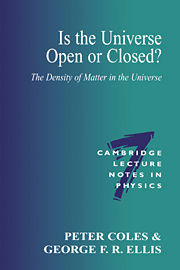2 - Theoretical arguments
Published online by Cambridge University Press: 25 January 2010
Summary
As we mentioned in Chapter 1, the main reasons for a predisposition towards a critical density universe are theoretical. We will address these issues carefully, but please be aware at the outset of our view that, ultimately, the question of Ω0 is an observational question and our theoretical prejudices must bow to empirical evidence.
Simplicity
In the period from the 1930s to the 1970s, there was a tendency to prefer the Einstein–de Sitter (critical density) model simply because – consequent on its vanishing spatial curvature – it is the simplest expanding universe model, with the simplest theoretical relationships applying in it. It is thus the easiest to use in studying the nature of cosmological evolution. It is known that, on the cosmological scale, spatial curvature is hard to detect (indeed we do not even know its sign), so the real value must be relatively close to zero. Moreover, many important properties of the universe are, to a good approximation, independent of the value of Ω. The pragmatic astrophysicist thus uses the simplest (critical density) model as the basis of his or her calculations – the results are good enough for many purposes (e.g. Rees 1995).
There are, in addition to this argument from simplicity, a number of deeper theoretical issues concerning the Friedman models which have led many cosmologists to adopt a stronger theoretical prejudice towards the Einstein–de Sitter cosmology than is motivated by pragmatism alone.
Information
- Type
- Chapter
- Information
- Is the Universe Open or Closed?The Density of Matter in the Universe, pp. 19 - 46Publisher: Cambridge University PressPrint publication year: 1997
